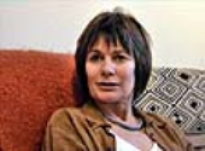Josefine - Interview 30

More about me...
Josefine was not in favour of organ donation. She does not think bodies should be used for spare parts.
Josefine was not in favour of organ donation. She does not think bodies should be used for spare parts.
After Nicholas died Josefine had experiences that convinced her that there is life after death. She has seen a medium who told her that people often have similar experiences.
After Nicholas died Josefine had experiences that convinced her that there is life after death. She has seen a medium who told her that people often have similar experiences.
Had you been, do you have an analyst you see regularly anyway?
Yes.
This wasn’t a particular appointment?
No. And I went to see a medium it was just some months actually, it was in the, when was it, it was in September of 2001 so Nicholas had been killed in June and my mother was ill and she actually died a week after I saw this Medium. The Medium was amazing, I couldn’t make quite sense of it then but it’s, it’s amazing. I suppose I at that time, it was true I was surrounded by death and that’s what she said, I mean I don’t want to go into that, any of that. I have seen her many times since then say once a year maybe I’ve been seeing her, and it helped me to understand these experiences and just find they’re normal, these experiences I was having and…
What happens when you see a Medium what’s, what’s the aim?
I suppose the aim is to understand better this mystery. And Nicholas is, he talks to her.
Josefine chose to spend many hours with Nicholas in the hospital mortuary before the post-mortem. Friends and relatives also visited during these 3 days.
Josefine chose to spend many hours with Nicholas in the hospital mortuary before the post-mortem. Friends and relatives also visited during these 3 days.
Josefine and her family acted as funeral directors. They had a daylong beautiful Quaker style ceremony on their own land to remember Nicholas. The next day they had a big event in London.
Josefine and her family acted as funeral directors. They had a daylong beautiful Quaker style ceremony on their own land to remember Nicholas. The next day they had a big event in London.
When it came to Nicholas’s funeral we very much did what we did for our friend. We had a sort of initial ceremony down below in this field where there was a structure set up so that people could sit around the coffin and a Quaker style ceremony where you could speak when you felt moved to speak and it was very, very beautiful. I think every funeral should have such a wonderful set up [laughter] and there were lots of us there, the elderly people sat on chairs and we all sat around on the structure we built and then up the hill there’s this little area for the graveside and we had another ceremony there and a very set ceremony, and one beautiful thing you can do with a bamboo coffin is you can weave flowers into the lid and it looked like a piece of jewelry, so beautiful. And June at that time on our land there’s a lot of Rhododendron [in flower] and people also brought flowers, well, I asked everybody to bring just one flower anyway but it was just so nice to be physically decorating the coffin together whilst it sat above the grave. And then we had a tea party in the field until the end of the day and the end of the day was where we danced in a very big circle around the grave as the sun was setting and we went back home to London, we had a whole day.


